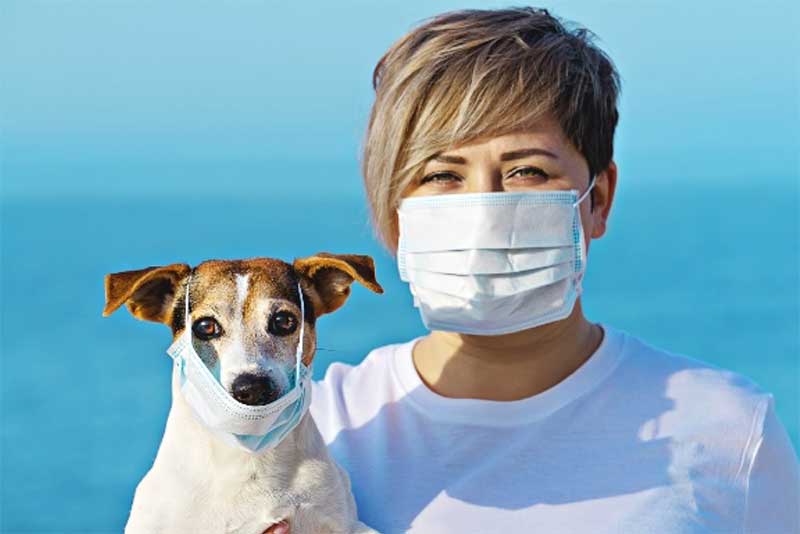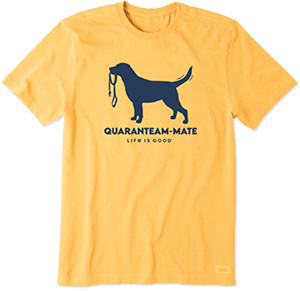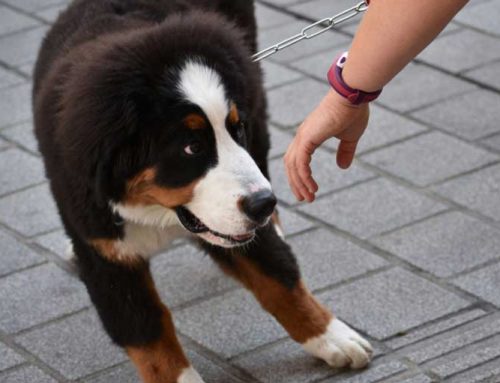
 Life Is Good, the popular apparel company, has put out a series of covid-19 shirts and one line carries a picture of a faithful lab with a leash and the title “Quaranteam-Mate”. As many Americans stay home and hunker down with their pets, there are a lot of questions about covid-19 and your pets. We thought we would offer a quick recap of the latest information, read between the lines a little bit, and encourage you to speak with your veterinarian if you have real concerns about catching covid from or giving covid to your pet.
Life Is Good, the popular apparel company, has put out a series of covid-19 shirts and one line carries a picture of a faithful lab with a leash and the title “Quaranteam-Mate”. As many Americans stay home and hunker down with their pets, there are a lot of questions about covid-19 and your pets. We thought we would offer a quick recap of the latest information, read between the lines a little bit, and encourage you to speak with your veterinarian if you have real concerns about catching covid from or giving covid to your pet.
Several articles have appeared over the last 6 months or so regarding pets and covid-19.
Question 1 is: Can your dog or cat get covid? The answer is YES, but it is very rare AND the only reported cases of covid in domestic dogs and cats happened when their owners tested positive and then the pets tested positive. The first case of covid in cats was reported in late April when federal officials confirmed two cats had tested positive. About the same time seven tigers at the Bronx Zoo tested positive as well. This was a real head scratcher because no one that had been around the tigers tested positive. The first dog to test positive for covid was another New York resident, a German Shepherd, who tested positive in May and was reported in early June.
Question 2 is: “Can I get covid from my dog or cat?” Right now the answer is NO. There are no reported cases of people catching covid-19 from their dog or cat. Common sense tells you it is theoretically possible, but the risk is just really low. According to the USDA, “Based on the limited information available, the risk of animals spreading the virus to people is considered to be low. There is no justification in taking measures against companion animals that may compromise their welfare.”
There are several points to keep in mind in this discussion.
- These pets had to be tested using sophisticated methods not generally available to the public. The human test for covid is not designed to work with animals. So don’t rush to your vet and have your dog or cat tested for covid-19. (God only knows what the cost would be!)
- The best source for covid-19 and pets is the USDA, not the CDC. The CDC has a hard time keeping their story straight with covid for humans. The USDA (and the American Veterinary Association) is much more in tune with companion animal issues and the veterinary community.
- There has been at least one study on covid and other pets. While the animals were infected in a laboratory setting, ferrets, cats and golden Syrian hamsters contracted the virus while pigs, chickens and ducks did not. Research has indicated that dogs are not as likely to be infected as cats and ferrets. This research dealt with small numbers and did not consider transmission from the pets to people.
- The Canine Corona Virus vaccinations for dogs treats a different strain of the corona virus (enteric or intestinal) and is not licensed or recommended to protect against respiratory corona virus. So, don’t rush to get a canine corona virus vaccine thinking it will protect your pet from covid -19.
- The bottom-line is wash your hands and don’t touch your face after interacting with your pet. But you were already doing that, right?
Since we have two pools, one outdoor (DockDogs) and one in-door for aqua therapy, folks have asked us about their pets, our pools and covid-19. According to the CDC and EPA (and common sense), “We know that tap water is safe and that pools, hot tubs and other chlorinated water sources are not a concern because the chlorine in the water inactivates the virus by disrupting the virus’ outer layer.” Sorry, but this is kind of a “duh” conclusion…the whole reason we chlorinate pools is to kill a variety of bacteria and virus’ in the environment, including covid-19. In addition, our pools have UV lights within our filtration system, which have been shown to kill bacteria and virus’.
Finally, in a recent study involving 2,000 cat and dog owners, 72% of pet owners said they would not have been able to get through the pandemic without their pet’s company and 81% said the rocky period made them feel even closer to their pets than before. On the flip side 2 out of 3 people wonder how their pets will react to them not being around much. Just remember Tin Woof Inn is here to help and our Daycare programs can help a lot with any of that separation anxiety. We hope you and your pets are safe and well, as Tin Woof Inn is here to celebrate that human-animal bond.
Scott Templeton and his wife Gale own 3 Tin Woof Inn locations (Morehead, Ashland, Frankfort). Scott has been in the pet industry professionally since 1993. He has designed, managed or operated nearly 20 pet facilities including two local pet shelters in Kentucky. He has supervised more than 269,000 pet stay days in his pet career. Prior to focusing on the pet industry he worked in senior marketing and operations management for 7-Eleven, Shell, Exxon-Mobil, Circle K, GTech and Intellimat in the US and UK. Scott and Gale live in Morehead with their 3 Australian Shepherds, 2 Border Collies and 3 cats.


Life Is Good, the popular apparel company, has put out a series of covid-19 shirts and one line carries a picture of a faithful lab with a leash and the title “Quaranteam-Mate”. As many Americans stay home and hunker down with their pets, there are a lot of questions about covid-19 and your pets. We thought we would offer a quick recap of the latest information, read between the lines a little bit, and encourage you to speak with your veterinarian if you have real concerns about catching covid from or giving covid to your pet.
Several articles have appeared over the last 6 months or so regarding pets and covid-19.
Question 1 is: Can your dog or cat get covid? The answer is YES, but it is very rare AND the only reported cases of covid in domestic dogs and cats happened when their owners tested positive and then the pets tested positive. The first case of covid in cats was reported in late April when federal officials confirmed two cats had tested positive. About the same time seven tigers at the Bronx Zoo tested positive as well. This was a real head scratcher because no one that had been around the tigers tested positive. The first dog to test positive for covid was another New York resident, a German Shepherd, who tested positive in May and was reported in early June.
Question 2 is: “Can I get covid from my dog or cat?” Right now the answer is NO. There are no reported cases of people catching covid-19 from their dog or cat. Common sense tells you it is theoretically possible, but the risk is just really low. According to the USDA, “Based on the limited information available, the risk of animals spreading the virus to people is considered to be low. There is no justification in taking measures against companion animals that may compromise their welfare.”
There are several points to keep in mind in this discussion.
- These pets had to be tested using sophisticated methods not generally available to the public. The human test for covid is not designed to work with animals. So don’t rush to your vet and have your dog or cat tested for covid-19. (God only knows what the cost would be!)
- The best source for covid-19 and pets is the USDA, not the CDC. The CDC has a hard time keeping their story straight with covid for humans. The USDA (and the American Veterinary Association) is much more in tune with companion animal issues and the veterinary community.
- There has been at least one study on covid and other pets. While the animals were infected in a laboratory setting, ferrets, cats and golden Syrian hamsters contracted the virus while pigs, chickens and ducks did not. Research has indicated that dogs are not as likely to be infected as cats and ferrets. This research dealt with small numbers and did not consider transmission from the pets to people.
- The Canine Corona Virus vaccinations for dogs treats a different strain of the corona virus (enteric or intestinal) and is not licensed or recommended to protect against respiratory corona virus. So, don’t rush to get a canine corona virus vaccine thinking it will protect your pet from covid -19.
- The bottom-line is wash your hands and don’t touch your face after interacting with your pet. But you were already doing that, right?
Since we have two pools, one outdoor (DockDogs) and one in-door for aqua therapy, folks have asked us about their pets, our pools and covid-19. According to the CDC and EPA (and common sense), “We know that tap water is safe and that pools, hot tubs and other chlorinated water sources are not a concern because the chlorine in the water inactivates the virus by disrupting the virus’ outer layer.” Sorry, but this is kind of a “duh” conclusion…the whole reason we chlorinate pools is to kill a variety of bacteria and virus’ in the environment, including covid-19. In addition, our pools have UV lights within our filtration system, which have been shown to kill bacteria and virus’.
Finally, in a recent study involving 2,000 cat and dog owners, 72% of pet owners said they would not have been able to get through the pandemic without their pet’s company and 81% said the rocky period made them feel even closer to their pets than before. On the flip side 2 out of 3 people wonder how their pets will react to them not being around much. Just remember Tin Woof Inn is here to help and our Daycare programs can help a lot with any of that separation anxiety. We hope you and your pets are safe and well, as Tin Woof Inn is here to celebrate that human-animal bond.
Scott Templeton and his wife Gale own 3 Tin Woof Inn locations (Morehead, Ashland, Frankfort). Scott has been in the pet industry professionally since 1993. He has designed, managed or operated nearly 20 pet facilities including two local pet shelters in Kentucky. He has supervised more than 269,000 pet stay days in his pet career. Prior to focusing on the pet industry he worked in senior marketing and operations management for 7-Eleven, Shell, Exxon-Mobil, Circle K, GTech and Intellimat in the US and UK. Scott and Gale live in Morehead with their 3 Australian Shepherds, 2 Border Collies and 3 cats.


